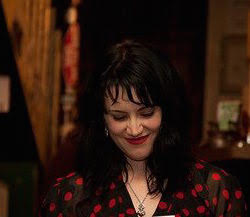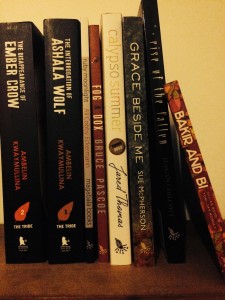 Bec Kavanagh is a Melbourne-based reader, reviewer and lover of books. In June, she blogged about the #weneeddiversebooks campaign established in the US, and now momentum is gathering around #weneeddiversebooksau in Australia. Below, Bec discusses her conversation with Indigenous author Ambelin Kwaymullina, as well as her efforts to promote diversity in Australian young adult fiction.
Bec Kavanagh is a Melbourne-based reader, reviewer and lover of books. In June, she blogged about the #weneeddiversebooks campaign established in the US, and now momentum is gathering around #weneeddiversebooksau in Australia. Below, Bec discusses her conversation with Indigenous author Ambelin Kwaymullina, as well as her efforts to promote diversity in Australian young adult fiction.
Also, those who read and review a book by an Indigenous women writer by the end of this month (you’ve a week left! )will be in the running for a copy of Gayle Kennedy’s wonderful Me, Antman & Fleabag.
#weneeddiversebooksau
At the 2015 Reading Matters conference, I had a conversation with YA author Ambelin Kwaymullina that made me realise I wasn’t looking hard enough for diversity in YA. And I’m probably not the only one.
When I was in high school, I remember standing in front of a wall of books, staring at the multiple, faded copies of Patrick O’Brian’s Master and Commander series and lamenting at my lack of ‘choice’. Of course, I didn’t really lack choice. A visit to my local library would see me come away with an armload of Robin Klein, Emily Rodda or Isobelle Carmody. Stories by Australian women weren’t exactly flooding the curriculum then (or now), but at least there were books that spoke to my experience. The problem is, my experience is pretty bog standard. I don’t need to look far to find myself.
I read a lot, and especially young adult (YA) fiction. I’m lucky, I get to talk about books most days – I visit schools and libraries to talk about books, I write about books, and I review them. I’d like to think I’ve got a fairly well rounded view of what the landscape of YA literature in Australia looks like. I remember writing an article almost four years ago about texts that fit in with the Australian curriculum priority of engaging with Aboriginal and Torres Strait Islander histories and cultures. I felt quite confident as I recommended books that tied into these themes, but few if any of them were written by Indigenous authors.
Ambelin Kwaymullina, author of the YA series The Tribe, identifies some of the issues with non-Indigenous writers telling Indigenous stories in this article from a pair of articles written for the Wheeler Centre.
Firstly, they occupy the space where our voices might have spoken, crowding out our struggles and identities in favour of a version of Indigenous people that bears no relationship to Indigenous realities. I’ve sometimes had aspiring non-Indigenous writers tell me they want to write about Indigenous peoples to fill the ‘gap’ which exists because Indigenous voices are not speaking. My question to such writers is: are you certain we’re not speaking?
There’s no room to hide in a conversation with Ambelin, and while it can be intimidating, it’s also exciting. She doesn’t avoid uncomfortable truths and she won’t let you avoid them either. The truth is, although I believe in the importance of diverse books, I’ve taken the easy road of reading the diverse books that are readily available, rather than actively seeking them out. For smaller publishers, such as Magabala, IAD Press and Aboriginal Studies Press, this is a huge problem. Their books might not have the same size or duration print runs as larger publishers. They might not end up on the desk of a magazine I review for. I might miss their season in a bookshop. So I came away from my conversation with Ambelin determined to fix this gap in my knowledge.
 A book challenge is such an easy thing, but it’s something that can lead to a new way of thinking. Mine isn’t exclusive or on a timeline. The challenge is simply to read as many YA books by Indigenous authors as possible and to review them. I can see the project growing already – a series of interviews with a number of authors (including Ambelin) from a range of diverse backgrounds is underway, and I plan to feature books that include other types of diversity as well, but this for me is a manageable place to start.
A book challenge is such an easy thing, but it’s something that can lead to a new way of thinking. Mine isn’t exclusive or on a timeline. The challenge is simply to read as many YA books by Indigenous authors as possible and to review them. I can see the project growing already – a series of interviews with a number of authors (including Ambelin) from a range of diverse backgrounds is underway, and I plan to feature books that include other types of diversity as well, but this for me is a manageable place to start.
I’m not the only one taking steps to promote diversity in Australian YA. Blogger Danielle Binks has run a fantastic series of posts at her blog Alpha Reader. These posts are written by Ambelin and tackle the ways different branches of the literary community can support diverse voices. Sarah Ayoub, a Lebanese-Australian author, has written a timely reminder that migrant teenagers are still underrepresented in YA in her article ‘Still looking for Alibrandi’. There is an endless supply of diversity in YA, but that doesn’t mean we should stop looking for it. It would be easy to find a challenge for every week of the rest of our reading lives. And maybe we should. Because when I think about my conversation with Ambelin, and the number of books I’ve been able to find with really minimal effort on my part, I think it’s not good enough that I hadn’t found them earlier. I don’t want to make that mistake again.






Trackbacks/Pingbacks